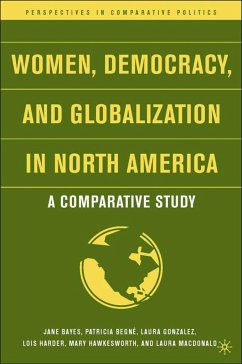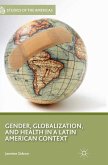This book examines the impact of globalization upon Canada, Mexico and the United States. It investigates changes in the structures and practices of federalism, in public policies and practices of governance and politics, and in economic livelihoods in all three nations. It also provides comparisons of the effects of globalization on women's lives.
"Women, Democracy, and Globalization skillfully juxtaposes the remarkably different gendered experiences with globalization in North America. By exploring the complex ideas about gender and social change, it embarks upon what should become a focus for future analysis in the 21st century - how to bring about social justice in an age of globalization - and provides a unique resource for those interested in the gendered struggle for democracy through historical and contemporary times. These complex stories of globalization will be essential reading in all courses on globalization." - Marjorie Griffin Cohen, Professor of Political Science and Women 's Studies and Chair of Women's Studies, Simon Fraser University
'The international contributors to Women, Democracy, and Globalization
in North America have produced an ambitious book that compares the history of women's political participation and the impact of globalization in three very different countries united by their participation in the North American Free Trade Area. The early chapters provide historical background, and the second half focuses on the economic effects of globalization in each country, emphasizing the feminization of the labor force and growing inequalities. The authors point out the striking fact that, in many respects, Canada and Mexico have far more gender democracy than the United States; their 'feminist frame' questions whether globalization is undermining the liberatory promises of democracy, especially for women'
- Jane Jaquette, Occidental College
'The international contributors to Women, Democracy, and Globalization
in North America have produced an ambitious book that compares the history of women's political participation and the impact of globalization in three very different countries united by their participation in the North American Free Trade Area. The early chapters provide historical background, and the second half focuses on the economic effects of globalization in each country, emphasizing the feminization of the labor force and growing inequalities. The authors point out the striking fact that, in many respects, Canada and Mexico have far more gender democracy than the United States; their 'feminist frame' questions whether globalization is undermining the liberatory promises of democracy, especially for women'
- Jane Jaquette, Occidental College








